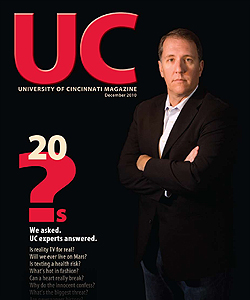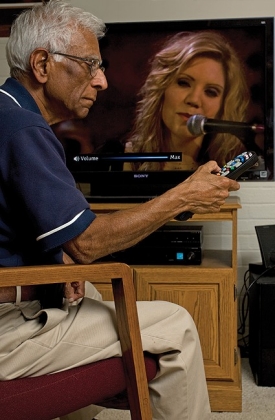Hearing Aids: Why won't Dad get them?
by Katy Cosse
Initial warning signs that a parent may need hearing aids are often misleading: Dad insists you never told him about an upcoming event, or Mom does not want to eat in restaurants anymore. The real issues are that Dad did not hear your announcement, and Mom can no longer hear in crowds.
Hearing aids may seem like a simple solution to the kids, who crave any device that can improve their lives, but Mom and Dad are rarely eager to embrace this particular technology.
"Unfortunately, Dad's idea of hearing aids probably involves a large, boxy device that emits feedback, has to be turned down for loud noises and whose use may have been discouraged by his physician," says John Greer Clark, assistant professor of audiology at the College of Allied Health Sciences.
He also probably thinks that they will not help him. Decades ago, most hearing aids did not help "nerve deafness," or its more accurate term "sensorineural hearing loss," Clark says.
But more than 95 percent of those who successfully wear hearing aids today have nerve deafness. Newer digital circuitry in the aids not only tailors sound to an individual's hearing loss, but also compresses intense sound before it reaches the amplifier, automatically reducing the sound level. This innovation has largely done away with volume controls on aids.
"There are also many older people who weren't guided properly in the selection and use of hearing aids and who failed to adapt to the new sounds they were hearing," Clark says. That outcome is rare today with the new technology, he adds, but if Dad has heard of one person who failed with hearing aids, it can be difficult to believe that it won't happen to him.
In that case, he should be reminded of the many benefits hearing aids now provide. "The use of hearing aids does more than just improve hearing," Clark says. "Research has shown that hearing aid use increases the satisfaction of one's home and social lives, employment productivity and overall health status."
If a friend or family member is reluctant to try hearing aids, Clark recommends encouraging them to talk with an audiologist, who can arrange for a fitting or a even 30-60 day trial period with hearing aids. Many audiologists will offer patients a refund if they don't find the aids beneficial.
"I know that both my reluctant mother and my uncle, who was similarly averse to the use of hearing aids, now readily provide strong testimony to all of their friends of the improvements better hearing has brought to their lives."

 Issue Archive
Issue Archive